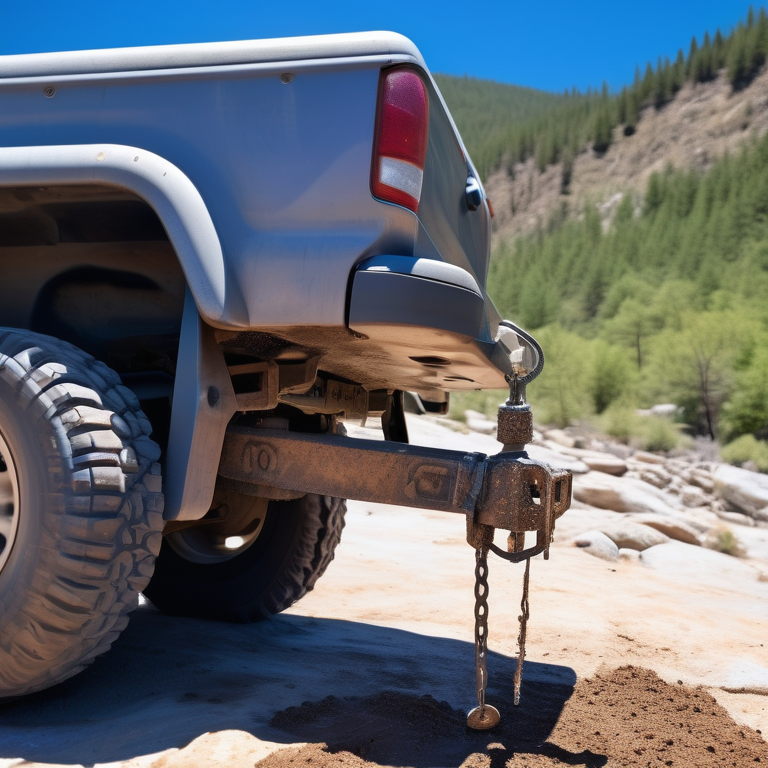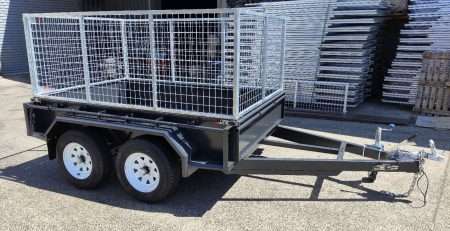
Discover the Best Off-Road Trailer Hitch Types
Key Highlights
- Off-road trailer hitches offer greater articulation and flexibility for tackling uneven terrain and rough off-road conditions.
- Choosing the right off-road trailer hitch is important for ensuring safe and secure towing.
- Articulating hitches provide unlimited articulation and vertical movement, making them ideal for extreme off-road conditions.
- Sw hitches offer improved maneuverability, ease of use, and a low-profile design.
- Popular off-road hitch models like the DO35 and DO45 offer features such as easy hitching, peace of mind, and stainless steel construction.
- Proper installation, maintenance, and safety considerations are essential for maximising the performance and durability of off-road trailer hitches.
Introduction
When it comes to towing a trailer off-road, having the right hitch is crucial. Designed to provide greater articulation and flexibility, off-road trailer hitches enable you to navigate uneven terrain and tackle rough off-road conditions with ease. Off-road adventures specifically build these hitches to ensure your trailer remains securely attached to your vehicle, making them the perfect choice for any offroad adventure, whether you’re towing a camper, caravan, or any type of trailer.
In this blog, we will explore the different types of off-road trailer hitches available and discuss their features, benefits, and applications. We will also provide valuable information on installation tips, maintenance considerations, and safety guidelines to help you make the most of your off-road towing experiences.
Whether you’re planning a camping trip in the wilderness or embarking on an off-road adventure, choosing the right off-road trailer hitch is essential for a safe and enjoyable experience. So, let’s dive in and discover the best off-road trailer hitch types that will suit your towing needs.
Understanding Off-Road Trailer Hitch Essentials
Before we delve into the different types of off-road trailer hitches, it’s important to understand some essential terms and concepts related to towing. The tow ball, also known as the trailer hitch ball, is the part of the hitch that attaches to the trailer. It allows for rotational movement between the tow vehicle and the trailer. The road coupling system, also known as the off-road quick release trailer hitch, is the mechanism that connects the trailer hitch ball to the trailer itself. This system, also referred to as the suspension, is crucial for switching between an off-road hitch and a standard ball hitch, making it suitable for a variety of off-road trailer systems.
Australian Standards regulate off-road trailer hitches in Australia to ensure their safety and performance. These standards outline the requirements and specifications that off-road hitches must meet to be considered compliant and suitable for use.
The significance of selecting the appropriate off-road trailer hitch is paramount.
Choosing the right off-road trailer hitch is crucial for several reasons. Firstly, it ensures the safety and stability of your trailer while towing, especially in off-road conditions where the terrain can be unpredictable and challenging. A properly selected off-road trailer hitch, as explained by Mark Allen in his comprehensive guide, will provide the necessary articulation and flexibility to handle uneven terrain and obstacles. The significance of selecting the appropriate off-road trailer hitch, including one with a handbrake, is paramount in ensuring a smooth and safe towing experience.
Secondly, the right off-road trailer hitch improves the trailer’s maneuverability, making it easier to navigate tight turns and narrow trails. It allows for improved control and responsiveness, giving you peace of mind while towing off-road.
Lastly, an off-road trailer hitch that is specifically designed for off-road use will have the durability and strength to withstand the rigours of off-road adventures. It will be built with high-quality materials to handle the demands of rough and rugged terrain.
Differentiating Between On-Road and Off-Road Hitches
When it comes to trailer hitches, there is a key distinction between on-road and off-road hitches. The design of on-road hitches allows for standard towing on paved roads and highways. They provide the necessary connection between the tow vehicle and the trailer while offering limited articulation and movement.
On the other hand, off-road hitches are specifically designed for towing in off-road conditions. They offer greater articulation and flexibility to handle uneven terrain, obstacles, and steep inclines. Off-road hitches allow for vertical movement, horizontal articulation, and unlimited articulation, making them ideal for challenging off-road adventures.
Off-road hitches also tend to have a lower profile design, allowing for better clearance and reducing the risk of damage from rocks, branches, or other obstacles on the trail. Built to withstand harsh conditions, they provide the necessary strength and durability required for off-road towing.
Exploring Types of Off-Road Trailer Hitches
Now that we have a better understanding of off-road trailer hitch essentials, let’s explore the different types of off-road trailer hitches available. These hitches offer various features and benefits, allowing you to choose the one that best suits your specific towing needs and off-road adventures.
Articulating Hitches for Extreme Off-Road Conditions
Extreme off-road conditions demand maximum articulation and flexibility, which is why we design articulating hitches. These hitches offer unlimited articulation, allowing the trailer to move in multiple directions to navigate rough terrain. Key features of articulating hitches include:
- Unlimited articulation: Articulating hitches can move in multiple directions, providing maximum flexibility on uneven terrain.
- These hitches allow for vertical movement, enabling the trailer to adapt to bumps and dips in the trail.
- Horizontal articulation: Articulating hitches allow the trailer to maneuver around obstacles and tight corners.
Articulating hitches are ideal for off-road enthusiasts who frequently encounter rugged trails, river banks, and steep inclines. They provide the necessary flexibility and maneuverability to tackle challenging off-road conditions with ease.
Swivel Hitches for Improved Manoeuvrability
Off-road towing situations benefit from the improved manoeuvrability and ease of use that swivel hitches provide. These hitches offer several benefits that make them a popular choice among off-road enthusiasts. Swivel hitches have the following key features:
- Swivel hitches are easy to use, saving you time and effort.
- Low profile: These hitches have a low profile design, reducing the risk of damage from rocks, branches, or other obstacles on the trail.
- Swivel hitches allow for horizontal movement in tight spaces and narrow trails, providing better control and maneuverability.
Swivel hitches are suitable for off-road adventures that require precise maneuvering, such as navigating through dense forests or tight campsite areas. They offer the convenience and flexibility needed for hassle-free off-road towing.
An in-depth examination of popular off-road hitch models is available.
In this section, we will take an in-depth look at two popular off-road hitch models: the DO35 and the DO45. These hitches are known for their durability, performance, and ease of use, making them top choices among off-road enthusiasts.
The DO35 Hitch: Features and Benefits
The DO35 hitch is a versatile and reliable off-road hitch that offers several features and benefits. Designed for ease of use and peace of mind, the DO35 hitch is a popular choice among off-road enthusiasts. The DO35 hitch offers several key features and benefits.
- Easy hitching: The DO35 hitch features a unique design that allows for quick and easy hitching, saving you time and effort.
- Peace of mind: With its robust construction and high-quality materials, the DO35 hitch provides peace of mind while towing off-road.
- Stainless steel construction: Stainless steel provides excellent durability and corrosion resistance in the construction of the DO35 hitch.
Comparing the DO45 to the DO35
When considering off-road hitch options, it’s essential to compare different models to find the one that best suits your towing needs. Let’s compare the DO45 and the DO35 to understand their similarities and differences.
| DO45 Hitch | DO35 Hitch |
| 4,500kg | |
| Easy Hitching Design | Yes |
| Peace of Mind | Yes |
| Stainless steel Construction | Yes |
| Additional Features | Improved articulation and movement – Compatible with various towing setups |
Both the DO45 and DO35 hitches offer ease of use, peace of mind, and stainless steel construction. However, the DO45 offers a higher maximum towing capacity and improved articulation and movement, making it suitable for more demanding off-road towing needs, such as with a camper trailer. The DO35, on the other hand, provides a quick release feature and is a better fit for trailers with lower ball weights. Additionally, the DO35 has been successively improved over the years and its latest V3 version is more than 50 per cent stronger than the outgoing V2, making it a reliable and durable option for off-road adventures.
Installation Tips and Tricks
Proper installation of an off-road trailer hitch is essential for safe and secure towing. Here are some installation tips and tricks to ensure a successful hitch installation:
- Take advantage of the hitch’s easy hitching design to simplify the installation process.
- Ensure proper hole alignment between the hitch and the tow vehicle for a secure attachment.
- Use a jockey wheel or a trailer jack to adjust the height and position of the trailer during installation.
Following these installation tips and tricks will help you properly install your off-road trailer hitch and ensure a smooth towing experience.
Preparing Your Vehicle for Off-Road Hitch Installation
Before installing an off-road hitch, it’s important to prepare your vehicle to ensure a successful installation. Here are some steps to follow:
- Ensure that your vehicle is compatible with the off-road hitch and meets the necessary requirements for towing capacity and towing setup.
- Check for any compatibility restrictions with your specific vehicle model and off-road hitch type.
- Make sure that your vehicle’s tow ball and towing setup are in good condition and meet Australian standards.
By preparing your vehicle properly, you can ensure a seamless installation process and maximise the performance of your off-road hitch.
Step-by-Step Guide to Installing an Off-Road Hitch
Installing an off-road hitch may seem daunting, but with the right tools and instructions, it can be a straightforward process. Here is a step-by-step guide to help you install your off-road hitch:
- Gather all the necessary tools and equipment for the installation, including wrenches, a trailer jack or jockey wheel, and any specific hardware provided with the hitch.
- Position the trailer in front of your vehicle, and use the trailer jack or jockey wheel to adjust the height of the trailer to align it with the tow vehicle’s tow ball.
- Attach the off-road hitch to the tow vehicle’s tow ball, ensuring a secure fit and proper alignment.
- Use the provided hardware to fasten the off-road hitch to the vehicle’s hitch receiver or frame, following the manufacturer’s instructions.
- Double-check all the connections and fastenings to ensure they are secure and tight.
- Test the hitch by applying some force to ensure it can withstand the towing load and movement.
- Finally, make any necessary adjustments and perform a final inspection before hitting the road.
By following these steps, you can install your off-road hitch successfully and be ready for your next off-road adventure.
Maintenance and safety considerations
Proper maintenance and safety considerations are essential for ensuring the longevity and performance of your off-road trailer hitch. Here are some maintenance and safety tips to keep in mind:
- Follow a regular maintenance checklist to inspect and maintain your off-road hitch, including lubricating moving parts, checking for wear and tear, and ensuring proper alignment.
- Adhere to safety guidelines and towing regulations specific to your area to ensure a safe and confident towing experience.
- Consider your towing needs and the weight of your trailer when selecting an off-road hitch to ensure it meets the necessary requirements.
By following these maintenance and safety considerations, you can enjoy worry-free off-road towing and maximise the lifespan of your off-road trailer hitch.
Regular Maintenance Checklist for Off-Road Hitches
Regular maintenance is essential for the longevity and performance of your off-road trailer hitch. Here is a checklist of maintenance tasks to keep your off-road hitch in optimal condition:
- Inspect the hitch for any signs of wear and tear, such as cracks, rust, or damaged components.
- Lubricate all moving parts, including the hitch ball, to ensure smooth operation and minimise friction.
- Check the tightness of all bolts and fasteners to ensure they are secure.
- Ensure proper alignment between the hitch and the tow vehicle to prevent excessive wear and stress on the hitch components.
- Clean the hitch regularly to remove dirt, debris, and grime that can affect its performance.
By following this regular maintenance checklist, you can ensure that your off-road hitch remains in top condition and performs reliably during your off-road adventures.
Safety Tips for Towing with an Off-Road Hitch
Towing with an off-road hitch requires careful attention to safety to ensure a safe and enjoyable towing experience. Here are some safety tips to keep in mind:
- Always adhere to the towing capacity and limitations specified by the manufacturer of your off-road hitch and your vehicle.
- Ensure that your trailer is properly loaded and balanced, with the majority of the weight distributed towards the front of the trailer.
- Check that all safety chains, electrical connections, and brake systems are properly attached and functioning correctly.
- Maintain a safe following distance and reduce your speed when towing off-road, as the terrain and conditions may require more time to react and stop.
- Be aware of the increased length and width of your vehicle and trailer when manoeuvring and turning, especially in tight spaces.
By following these safety tips, you can minimise the risk of accidents and ensure a safe and enjoyable off-road towing experience.
Real-World Applications of Off-Road Hitches
Off-road hitches have a wide range of real-world applications and are used by off-road enthusiasts in various scenarios. Let’s explore some of the common real-world applications of off-road hitches through case studies and user testimonials.
Case Studies: How Off-Road Hitches Perform in the Wild
Case studies provide valuable insights into how off-road hitches perform in real-world off-road conditions. Let’s take a look at a few case studies to understand their applications and benefits.
User Testimonials and Recommendations
User testimonials offer first-hand accounts of the experiences and satisfaction of off-road enthusiasts who have used off-road hitches. Let’s hear from some users who have shared their testimonials and recommendations.
Conclusion
Off-road trailer hitches are pivotal for a smooth and safe towing experience. Choosing the right hitch type based on your needs and off-road conditions is essential. Whether you opt for articulating hitches for extreme terrain or swivel hitches for improved manoeuvrability, prioritise durability and performance. Regular maintenance and adherence to safety guidelines ensure longevity and reliability in your towing ventures. Real-world applications showcase the efficacy of off-road hitches, supported by user testimonials. Understanding the differences between hitch types, selecting compatible options, and considering legal aspects enhance your off-road adventures. Elevate your off-road towing with high-quality hitches tailored to your specific requirements.
Frequently Asked Questions
What makes an off-road hitch different from a regular hitch?
An off-road hitch differs from a regular hitch in its ability to provide greater articulation, allowing the trailer to move more freely in multiple directions. It may also incorporate a weight distribution system to evenly distribute the weight of the trailer and improve stability. Additionally, off-road hitches may use a different type of ball coupling that is specifically designed for off-road conditions.
Can I install an off-road hitch on any vehicle?
Off-road hitches can be installed on a range of vehicles, including 4WDs, SUVs, and trucks. However, it’s important to ensure that the off-road hitch is compatible with your specific vehicle model and towing setup. Some off-road hitches may require a different type of ball coupling than the standard ball used in regular hitches. Always check the manufacturer’s guidelines and consult a professional if unsure about compatibility.
How Do I Choose the Right Off-Road Hitch for My Trailer?
When choosing the right off-road hitch for your trailer, consider factors such as your towing needs, the weight of the trailer, and the ease of use of the hitch. Determine the towing capacity required for your trailer and select an off-road hitch that can handle that weight. Additionally, consider the specific features and design of the hitch that align with your towing preferences and requirements.
Are There Any Legal Considerations for Using Off-Road Hitches?
Yes, there are legal considerations for using off-road hitches. Off-road hitches must meet Australian standards and have a component type approval (CTA) to ensure their safety and compliance. It’s essential to ensure that your off-road hitch meets the necessary legal requirements and is used in accordance with towing regulations specific to your area.
What Are the Most Common Issues with Off-Road Hitches?
Common issues with off-road hitches can include wear and tear, improper maintenance, and damage to components such as the dust cap. Regular maintenance, including lubrication and cleaning, can help prevent these issues. It’s important to inspect your off-road hitch regularly and address any maintenance or repair needs promptly to ensure its optimal performance.
Where can I purchase high-quality off-road hitches?
High-quality off-road hitches can be purchased from reputable manufacturers and retailers specialising in towing equipment. Look for manufacturers with a reputation for producing durable and reliable off-road hitches. Consider factors such as product warranty, customer reviews, and the manufacturer’s track record to ensure you are purchasing a high-quality off-road hitch.
What are the different types of trailer hitches?
There are several different types of trailer hitches available, including standard ball hitches, pintle hitches, fifth-wheel hitches, gooseneck hitches, and weight distribution hitches. These hitches vary in their design and capabilities, accommodating different trailer types, ball weights, and towing setups. Choose the type of hitch that best suits your specific towing needs and trailer requirements.
What is the best off-road articulating hitch?
When it comes to off-road articulating hitches, the best choice offers durability and flexibility for extreme terrain. Look for features like robust construction and a wide range of motion to navigate challenging off-road conditions effectively.
What is the difference between a DO35 and DO45 hitch?
The main difference between the DO35 and DO45 hitches lies in their towing capacity and specific features. The DO35 hitch has a maximum towing capacity of 3,500 kg and offers features such as easy hitching, peace of mind, and stainless steel construction. The DO45 hitch has a higher maximum towing capacity of 4,500 kg and includes improved articulation and movement, making it suitable for more demanding off-road towing needs.
Do I need an off-road hitch?
Whether or not you need an off-road hitch depends on your specific towing needs and the type of terrain you plan to navigate. If you frequently tow off-road and encounter rough or uneven terrain, an off-road hitch can provide the necessary articulation and flexibility for safe and secure towing. Assess your towing requirements and the conditions you expect to encounter to determine if an off-road hitch is necessary for your towing adventures.
Which type of off-road trailer hitch is best for heavy-duty usage?
For heavy-duty usage, off-road trailer hitches with a weight distribution system are recommended. These hitches distribute the weight of the trailer more evenly across the tow vehicle and trailer axles, improving stability and handling. Consider the towing capacity and weight distribution capabilities of the hitch to ensure it can handle heavy-duty towing needs.
What features should I look for in an off-road trailer hitch for increased durability and performance?
When selecting an off-road trailer hitch for increased durability and performance, look for features such as construction from high-quality materials, including stainless steel, which offers excellent durability and corrosion resistance. Consider the hitch’s design, ease of use, and compatibility with your towing setup to ensure it meets your specific requirements.
Can all types of off-road trailer hitches be used with any vehicle, or are there compatibility restrictions?
While many off-road trailer hitches are compatible with a range of vehicles, there may be compatibility restrictions based on the specific hitch and vehicle model. It’s important to check the manufacturer’s guidelines and recommendations to ensure that the off-road trailer hitch is compatible with your vehicle and towing setup before installation.
Are there specific considerations to keep in mind when choosing an off-road trailer hitch type?
When choosing an off-road trailer hitch type, consider factors such as the weight of your trailer, the towing capacity of your vehicle, the terrain you plan to navigate, and your specific towing preferences. Determine the features and capabilities that align with your needs to ensure you choose the right off-road trailer hitch for your towing adventures.
What kind of hitch do I need for a travel trailer?
For a travel trailer, you will need a hitch that offers ease of use and secure attachment. Off-road hitches with features such as easy hitching, peace of mind, and compatibility with various towing setups are suitable options for travel trailers. Consider the weight of your travel trailer and any specific towing requirements to select the appropriate hitch type.
How do different hitch types affect the manoeuvrability and stability of the off-road trailer on rough terrain?
Different hitch types can have varying effects on the manoeuvrability and stability of an off-road trailer on rough terrain. Articulating hitches offer greater flexibility and manoeuvrability, allowing the trailer to adapt to uneven terrain. Swivel hitches provide improved manoeuvrability with ease of use and a low-profile design. These features enhance the trailer’s stability and control in challenging off-road conditions.
Author
I am Rahatul Ashiq Tamal. Another author of Muscle Trailers. Muscle Trailers is a well-known trailer brand in Sydney, Melbourne & Adelaide

How to Mount a Spare Tire on Your Trailer: A Simple Step-by-Step Guide
Trailer service centers receive over 1 million phone calls and 1.3 million emails each year about trailer maintenance problems....

How to Fix RV Roof Leaks: Simple Roof Leak Detection Guide for Beginners
Did you know DIY RV roof repairs can cost under $50? But undetected leaks could lead to substantially higher repair...

Starting a Food Truck Business in Australia: From Trailer Selection to Launch
The Australian mobile food market has evolved into a billion-dollar industry. This makes a food truck...
